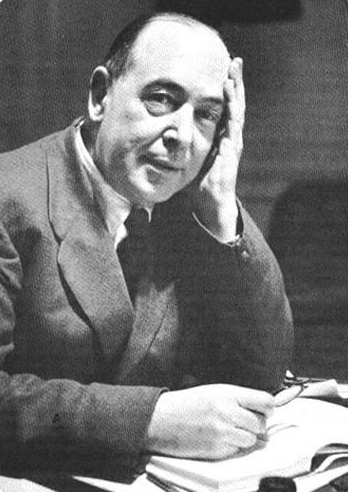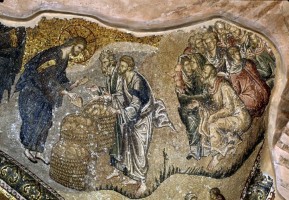[Ancient Faith Radio; October 30, 2008]
Why C. S. Lewis is So Irritating! Part 1
We’re back with another episode of “Why CS Lewis is So Irritating!”. And the reason that CS Lewis is so irritating, if you’re a writer, is that he already said everything. He could have left some stuff for me to come up with, but no, it’s all right there, and it’s beautiful, it’s elegant, it’s concise, it’s zing!, it’s just teriffic stuff. But he wasn’t very generous, he didn’t leave stuff over that I would eventually think of one day.
 Right now the writing of CS Lewis that I have most recently discovered and very struck with is an essay in the book entitled, ‘God In The Dock’, and he means like in a courtroom, like a criminal in the dock. ‘God in the Dock’, that we are an age that judges God. And it was not a book that was put together by CS Lewis, but by Walter Hooper, who edited his literary estate. It is a collection of essays that had not been previously published. And this particular one which is just titled ‘Miracles’, it says, was preached as a sermon in St. Jude on the Hill Church in London, on November 26th, 1942.
Right now the writing of CS Lewis that I have most recently discovered and very struck with is an essay in the book entitled, ‘God In The Dock’, and he means like in a courtroom, like a criminal in the dock. ‘God in the Dock’, that we are an age that judges God. And it was not a book that was put together by CS Lewis, but by Walter Hooper, who edited his literary estate. It is a collection of essays that had not been previously published. And this particular one which is just titled ‘Miracles’, it says, was preached as a sermon in St. Jude on the Hill Church in London, on November 26th, 1942.
He makes two points here about miracles that I find just so helpful and so wonderful. The first is about the fact that there’s a lot of skepticism about miracles, and I certainly heard this when I was in seminary; the argument from professors and others that God would not violate His own laws, that he set up gravity to work in a certain way, and the cycles of nature, and he wouldn’t fiddle with that. There’s beauty in the way that all of nature rolls forward, so he wouldn’t intervene and scramble up what he had already made. I can see one thing that they’re trying to achieve in that, that is positive, which is that they are trying to see nature as filled with the energy and the working of God. Of course that’s true, but they come to an erroneous conclusion, I think. And here’s the key to why that is, and CS Lewis generously gives the credit to something that he said, “I have only recently found the answer to this objection. I found it first in George MacDonald, and then later in St. Athanasius. Here’s what St. Athanasius says in his little book, ‘On the Incarnation’.” And here’s Lewis quoting St. Athanasius: “‘Our Lord took a body like to ours and lived as a man in order that those who refused to recognize Him in His superintendance and captaincy of the whole universe, might come to recognize, from the works He did here below in the body, that what dwelled in this body was the Word of God.’” And Lewis goes on to say, to sort of expand this: “There is an activity of God displayed throughout creation, a wholesale activity, let us say, which men refuse to recognize.”
And he goes on to give some examples. “God creates the vine, and teaches it to draw up water by its roots, and with the aid of the sun, to turn that water into a juice which will ferment and take on certain qualities. Thus every year from Noah’s time to ours God turns water into wine. That, men fail to see. But when Christ at Cana makes water into wine, the mask is off. Every year God turns a little corn into much corn; the seed is sown, and there is an increase. The translation of this annual wonder is the feeding of the five thousand. When he fed the thousands, he multiplied fish as well as bread. Look in every bay and almost every river. This swarming, pulsing fecundity shows he is still at work. The miracles of healing fall into the same pattern. This is sometimes obscured from us by the somewhat magical view we tend to take of ordinary medicine. The doctors do not take this view. The magic is not in the medicine, but in the patient’s body. What the doctor does is to stimulate nature’s functions in the body or to remove hindrances. Though we speak of healing a cut, every cut heals itself. No dressing will make skin grow over a cut on a corpse. That same mysterious energy which we call gravitation when it steers the planets, and biochemical when it heals the body, is the efficient cause of all recoveries. And if God exists, that energy, directly or indirectly, is His. All who are healed are healed by Him, the Healer within. But once he did it visibly: a man meeting a man.”
So he summarizes this: “The miracles done by God Incarnate, living as a man in Palestine, performed the very same things as this wholesale activity, but at a different speed and on a smaller scale. One of their chief purposes is that men, having seen the thing done by personal power on a small scale, may recognize, when they see the same thing done on a large scale, that the power behind it is also personal, is indeed the very same Person who lived among us nearly two thousand years ago. The miracles, in fact, are retelling in small letters of the very same story that is written across the whole world in letters too large for some of us to see.”
Isn’t that great? Darn it. (laughs) But, as if that wasn’t enough, he takes it to a different step, and this was something that I thought was pretty mind blowing. It’s something I never thought of. Returning to that instance of the feeding of the five thousand, that He multiplies the corn, multiplies the wheat, and makes so much food that He feeds everyone. Get a load of this. Lewis says, “Bread is not made there out of nothing. Bread is not made of stones, as the devil once suggested to Our Lord in vain. A little bread is made into much bread.” And he cites the scripture, Gospel of John 5:19: “The Son can do nothing of Himself but what He sees the Father do.” Lewis says, “The Son will do nothing of Himself but what He sees the Father do. There is, so to speak, a family style.”
I’m going to skip to the next page here. “I am trying to answer those who think that miracles are arbitrary, theatrical, unworthy of God, meaningless interruptions of universal order. They remain in my view wholly miraculous. To do instantly with dead and baked corn (wheat) what ordinarily happens slowly with live seed is just as great a miracle as to make bread of stones. Just as great, but a different kind of miracle. That is the point. When I open Ovid or The Brothers Grimm, I find the sort of miracles which really would be arbitrary. Trees talk, houses turn into trees, magic rings raise tables richly spread with food in lonely places, ships become goddesses, and men are changed into snakes or birds or bears. It is fun to read about: the least suspicion that it had really happened would turn that fun into nightmare. You find no miracles of that kind in the Gospels. Such things, if they could be, would prove that some alien power was invading nature; they would not in the least prove that it was the same power which had made nature and rules her every day. But the true miracles express not simply a god, but God: that which is outside Nature, not as a foreigner, but as her sovereign. They announce not merely that a king has visited our town, but that it is the King, our King.”
That’s just so terrific. I’d never thought about the miracles like that, and it made me wish I had read this thirty years ago, when I was in seminary, so I would have had a better answer. I love the part about the miracles doing in a small and visibly personal way what is done throughout the whole universe written in letters too large for us to see. St. Nikolai Velimirovic wrote in the Prologue from Ochrid—that wonderful collection of daily readings of lives of the saints—there’s a passage, and I don’t think I can put my hand on it this minute, but he talks about nature being analogous to a train engine, with all the parts working together. He said, if a child saw a train engine for the first time he might be afraid because it’s big and it’s noisy and it’s so obviously powerful. But he said, if the engineer puts his face out and waves, how reassuring that is! Because the child sees not only the control within the engine, but a face like his, a human face. It is the dear face of our Lord that we see in the workings of nature, as if He puts out His hand and waves at us. Isn’t that, that’s just so adorable.
This part about doing on a small and undeniably personal scale what is written in these large letters, that’s great. But the second part, that it’s not like the miracles in fairy tales—it is not turning stones to bread. It is not doing something that crashes through nature and subverts it and changes it. It’s doing things faster or slower, making it run backwards. In a car, you can make it go forward, if you want it to, it’s made to do that. If you want, you could put it in reverse and drive through town. It’ll do that. But it’s not going to lift off the ground like a helicopter. So, in a sense, the miracles of Christ are all compatible with the nature He himself designed and set in motion. And something like the resurrection of the dead—we see it in the vision of the dry bones, Can these bones live? Well, if it’s God’s will, they will live. And the flesh will come back on the bones and they will stand up and be human beings again.
There are some of Christ’s miracles, Lewis says, like the Ascension, that seem to be wholly inexplicable from our point of view. We should take them as prophetic. Some of His miracles point to things that He has shown from the beginning of the creation of the world, the natural order of nature. But some miracles are pointing to things that haven’t happened yet. This mystery about when He appears, we’ll be caught up together in the air- is that going to be like what the Ascension was like? What did the Ascension look like, anyway? Apparently God didn’t think we needed a videotape, so we can’t really envision it. So Lewis deals with those miracles that don’t look like anything we know in nature by saying that they are probably prophetic.
But at the same time, they are still not arbitrary. They’re not like turning stones into bread. That’s just so genius. And it’s more evidence of what I say, that if CS Lewis hadn’t taken all the good ideas, and said them so well, the world would be a lot easier for writers like me. So I’ll be back in the future with more episodes of “Why CS Lewis is Just So Irritating!”
Source and copyright: Frederica Mathewes-Green



















